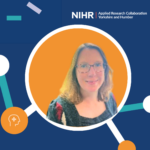Bridging the Digital Divide for People with Severe Mental Ill-health
The problem: Access to the internet and knowing how to use digital devices is important for everyday life and work, especially since many face-to-face services in health and social care are now online. Equal access to digital health and care resources (digital inclusion) is an NHS priority, but some groups may be missing out. This unequal access to the internet is known as the digital divide. There is now growing evidence that in an increasingly digital world, people with severe mental ill-health (SMI) experience this digital divide. They are at greater risk of being ‘digitally excluded’, meaning they may have poorer access to digital technology or lack the skills and confidence to do things online.
What our ARC is doing to help solve this: Our Mental Health theme are currently running the following projects: (1) SPIDER: Skills and Proficiency in Digital Essential Requirements and (2) DRAGON: Digital Resources and Going ONline.
SPIDER, a survey study aiming to understand whether people with SMI have the skills they need to fully engage with and benefit from the internet and digital technologies, was completed by 249 people with SMI. Following the survey, creative resources were co-produced and designed for use by both people with lived experience of SMI and healthcare professionals who support them.
The DRAGON project is evaluating how to best support people with SMI to learn digital skills. We piloted a six-week ‘Learn My Way’ course, with people with SMI, which included support by an experienced digital tutor and a peer support worker. We assessed people’s digital skills and
confidence at the start and end of the course and three months after.
Our results and impact – The SPIDER project
- We found that around 4 in 10 people with SMI lacked foundation digital skills, especially changing passwords and settings.
- Resources to improve this have been created and shared with NHS colleagues across Yorkshire and Humber.
- We worked with the Made By Mortals Theatre Company to create an audio experience. You can listen to Hidden – Joanna’s Story here: bit.ly/3HNi5wl.
Our results and impact – The DRAGON project
- We found that a supported ‘Learn My Way’ course can help people with SMI develop digital skills but may need to be extended to give people extra time to build skills.
- We are planning to run the ‘Learn My Way’ course in two other Recovery Colleges.
Details:
Theme:
Team:

Research Fellow